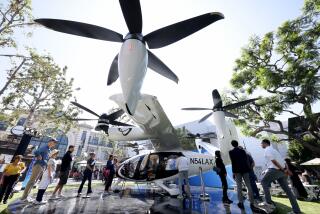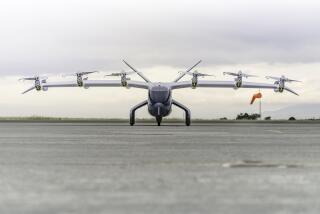Panel to Consider a 2nd Taxi Franchise for Area : Transportation: Allowing a Burbank firm to provide service would end a Valley Cab monopoly.
- Share via
The Los Angeles Transportation Commission on Thursday will consider whether to award a second taxi franchise for the San Fernando Valley--ending an eight-year monopoly by Valley Cab Co.
The commission will discuss a recommendation Monday by the city Department of Transportation to authorize Babaeian Transportation Co. of Burbank to provide taxi services in the Valley for two years.
If the commission concurs, the franchise recommendation will be sent to the Los Angeles City Council and Mayor Tom Bradley for approval.
The commission chose Babaeian over United Independent Taxi Drivers Inc., Independent Taxi Owners Assn. and Los Angeles Checker Cab Co. Inc., which holds one of five taxi franchises downtown.
The recommendation was a blow to Valley Cab, which has vigorously lobbied the City Council to quash the proposal to allow a second cab company in the Valley. Valley Cab has been the only taxi service licensed by the city to do business in the Valley since 1984.
City officials say franchise agreements allow the city to regulate safety, insurance and service standards and ensure that the taxi companies--and the city--make a profit.
Franchised taxi companies pay $64 a month per cab for city permits to cruise for fares in assigned districts.
Babaeian, which has campaigned intensively to get the city to offer a second Valley franchise, operates about 100 Checker cabs in Glendale, Burbank and Pasadena.
“We are very happy,” said Rick Ward, a Babaeian operations manager who would become general manager of the San Fernando Checker Cab fleet if Babaeian is granted the franchise.
Gil Archuletta, an attorney who has spearheaded Babaeian’s lobbying efforts at City Hall, said the campaign had “been a long, arduous process and we are looking forward to serving the Valley.”
No Valley Cab spokesman could be reached for comment.
A second franchise was initially proposed in response to complaints by Valley residents about the service provided by Valley Cab, said Alan Willis, a senior transportation engineer in charge of the city’s franchise regulation division. A Department of Transportation study, however, found that drivers for Valley Cab met the city’s service requirement, which requires that cabs pick up customers within 15 minutes of being called no less than 76% of the time.
Despite the study, the City Council voted unanimously in June to seek a second franchise, saying that would provide competition and improve service.
Cab companies bidding for the franchise were rated on several criteria, including experience, ability to provide services and management plan. “We were looking for high-quality service,” Willis said.
Willis said the second taxi franchise could begin service in the summer. Archuletta, however, said he believes city officials want the second taxi fleet to begin serving the Valley sooner, possibly within two months.
Ward said Babaeian plans to provide 85 taxis, including five “clean-air vehicles” that would run on natural gas and five wheelchair-accessible vans.
The dispatch system for the Valley’s new fleet will be computerized to improve efficiency, he said.
Babaeian also will provide telephone-keyboard service for the deaf and bilingual operators for Spanish-speaking customers, he said.
The city normally issues five-year franchise agreements, but the second Valley taxi franchise is set to expire in August, 1994, along with the franchise agreements of all the city’s taxi companies, so that city officials can reconsider all the franchises simultaneously, Willis said.
Archuletta acknowledged that several Babaeian drivers have been arrested for illegally picking up fares in the Valley franchise area.
But he described those cases as “a couple of minor instances on the fringe of the Valley.”
No Babaeian driver has been prosecuted because the pickups were due to mistakes by the drivers or a dispatcher, the Transportation Department said.
More to Read
Sign up for Essential California
The most important California stories and recommendations in your inbox every morning.
You may occasionally receive promotional content from the Los Angeles Times.











